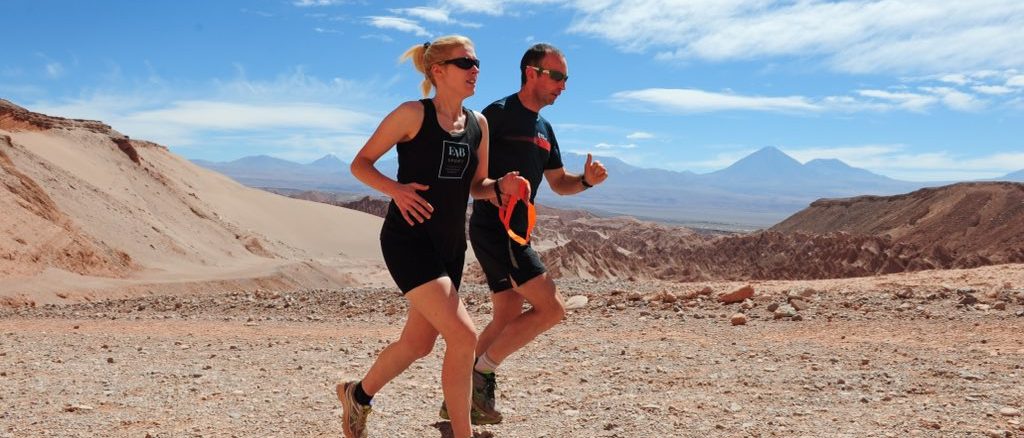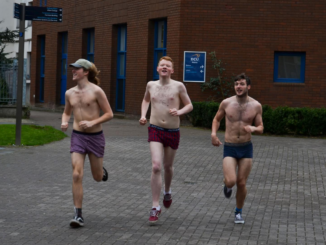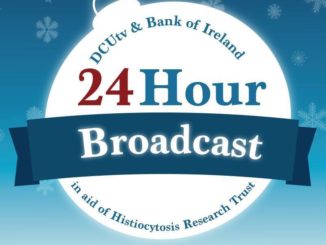
[dropcap]It’s[/dropcap] 6am on Monday, January 29th and the first rays of morning sunlight are peering over the Sydney horizon. All around the landscape the only sounds that can be heard are measured exhales of breath followed by two pairs of feet crunching against the hot Australian terrain.
Over 150 miles have been clocked up by this stage. Sweat, blood and tears have come and gone and the finish line is finally in sight for Sinéad Kane. She has just five per cent vision, is registered as blind and and suffers from four different eye conditions: congenital aniridia, coloboma, nystagmus and glaucoma.
She is led on a tether by her guide-runner John O’Regan, measuring her final paces carefully as the weight of seven marathons across seven continents in the space of seven days bears its brunt.
This is the World Marathon Challenge and she has just become the first visually impaired person to complete it, as she crosses the finish line with blisters on her feet and a peculiar wave of sadness washing over her.
“The problem with goal-setting is that you prepare so much in advance of the goal, you don’t prepare what to do after you have reached it,” she says.
“I did feel a very real sense of sadness; I wasn’t expecting it to hit me as quickly as it did. We finished at 6am very early on the Monday morning and by that afternoon I realised I didn’t have to get ready for the next marathon.”
“I started feeling sad, I thought I would be feeling joyful, but I started thinking ‘what am I going to do next? I have been planning this for a full year…’ All of my focus, everything I had ate, slept, and breathed was over. My guide runner said to me, ‘just enjoy this moment now, enjoy the achievement,’ but I suppose I couldn’t.”
Kane has had to overcome obstacles at every stage in her life. From the bullies in school who hid her bag from her, to marathon promoters who wanted to charge extra for her guide runner, to sponsors who pulled out much-needed funding for her latest marathon challenge, only to try and claim credit afterwards.
It has all built up to form a steely determination inside of her. She admits that all of the setbacks and moments of lonely isolation did play heavily on her mind during the challenge. But in using it as a motivational tool she would overcome the demons of her past to achieve something truly remarkable.
“All of that was going through my head, but the best revenge in life is success. This was my revenge for the people who had hurt me, for the sponsors who had pulled out.”
This is just a chapter in the 33-year-old’s life so far. A full-time PhD researcher with the National Anti-Bullying Centre in DCU, she became Ireland’s first registered blind solicitor in 2009, is a certified mediator, a writer for the Irish Criminal Law Journal, a motivational speaker and a director with Ablevision Ireland.
Having earned her BCL law degree and an LLM Masters in law from UCC , she successfully lobbied for the introduction of a section of legislation in relation to assistance for blind solicitors in court in 2008.
Arrived back in Dublin airport early this morning. The task maybe over but the next page begins. pic.twitter.com/8yFcljdNbi
— Sinead Kane (@KaneSinead) February 2, 2017
She thinks methodically about her condition, but maintains that the reason she undertook the challenge was to show others that disability cannot hold a person back. She says that people suffering from visual impairment possess more emotional engagement due to a lack of judgement based on outward appearances.
This is why, she says, Antarctica was her favourite location from her seven expeditions which included Chile, Miami, Madrid, Marrakech, Dubai and Sydney in quick succession.
“The best revenge in life is success.”
A brutal wasteland of ice and snow, the absence of wi-fi meant competitors had to engage with one another through the dying art of conversation. With people constantly engrossed in the contents of their mobile phones, Kane says that people with visual impairment can often feel isolated.
“We live in such a social media dominated world where people don’t have empathy and they don’t have human connection. I think that people with disability and visual impairment have empathy because they don’t judge people by their appearance because we can’t judge people by their appearances — we take the person for who they are.”
“The whole point of doing this challenge is to show people that disability does not hold you back.”
“If something doesn’t challenge you, it won’t change you. It changed me for the better because the confidence I get from running, that transfers over to other areas of my life.”
“On my tough days with my PhD, when I can say that I’m tired or my eyes hurt, when I wonder what’s the point, I can say to myself you were able to achieve in the World Marathon Challenge. It was a character-building experience.”
Aaron Gallagher
Image credit: sineadkane.ie



